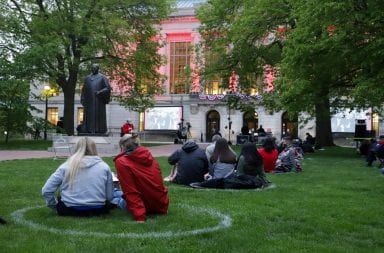The quiet sound of a humming furnace quickly becomes background noise to many people.
For The Wilderness of Manitoba, that background noise made it onto half of its debut album.
The Canadian chamber-folk band is scheduled to play at Woodland’s Tavern Tuesday at 9 p.m.
For the band, the furnace was a necessity in the recording process. “When You Left the Fire,” the first album from the quintet, was recorded in the basement of a house the band members used to share, and during the winter, the basement would freeze.
“There are moments where it’s (the furnace) actually turned on in the middle of a really good take and you can’t lose that take, so you just … hear the furnace a little bit,” said vocalist Melissa Dalton.
For Dalton, the addition of the furnace to some of the band’s songs didn’t destroy the integrity of the songs, but rather cast an honest light on them.
“I think, partly, we like our recordings to be honest,” she said. “There are parts where we would have maybe have tried to take it out, but I think in the end, it’s just about being honest about the recording. (If) it’s not taking away from the song, then why not?”
As it turns out, that simple mistake was a coincidental blessing in disguise.
With the title of the album having to deal with fire, and songs like “Summer Fires” and “Reveries En Couleurs,” which ends with a crackling fire, the heated furnace fits in well with the album’s theme, Dalton said.
“As an afterthought, it kind of works,” she said.
A furnace isn’t the only quirky sound found on the album. The band likes to experimentally find new instruments, which in this case includes a bowl.
“We like to create … sound walls at certain points in our songs,” Dalton said. “Singing bowls have this natural, very high-pitched resonance.”
Aside from bowls and furnaces, there are the traditional instruments that make up the band: guitar, bass and drums. There are also instruments not traditionally found in touring bands, like the banjo and the cello.
As the banjo and cello player for the band, Stefan Banjevic said most of his inspiration to write came from the fact that he just learned the banjo.
“A lot of those banjo tunes came out because I just recently picked up the banjo, and so when you pick up a new instrument, you have all of these ideas all of a sudden come at you because you’re seeing all of these things come at you,” Banjevic said. “It’s usually something new that you just tap into.”
Banjevic also wrote some of the lyrics, such as those for “Orono Park.”
“(Writing is a) long and arduous process for me,” Banjevic said. “I’m not somebody that just starts writing all of these amazing things, so sometimes I have to really work at it.”
On the flip side, Dalton draws her inspiration from the nature she sees on the road that passes her by.
Seeing snow on mountains can “pull some feelings from you, you didn’t know were there,” she said.
Nature is a major theme across the whole album, which partly stems from the band’s name.
There was a film installation named “The Wildflowers of Manitoba” by Noam Gonick. Band member Scott Bouwmeester heard about the installation and approached member Will Whitwham with the misunderstood name, Wilderness of Manitoba.
That wasn’t the only misunderstanding for the band. For a short period of time, Dalton didn’t even know she was in the band.
Initially, Dalton asked the band, comprised of Bouwmeester and Whitwham at the time, to play with her while she sang at a few solo shows. In return, she sang some of the band’s songs when it played its shows.
“At a show, I announced they (the band) were playing next week, and they were like, ‘Hey, you’re in the band, too,'” Dalton said.
Now that time has passed and all band members are on the same page, the band continues on in hopes of finding where its music will take it.
“I think we’re (playing) ‘cause it’s fun,” Banjevic said. “We all like playing music.”


